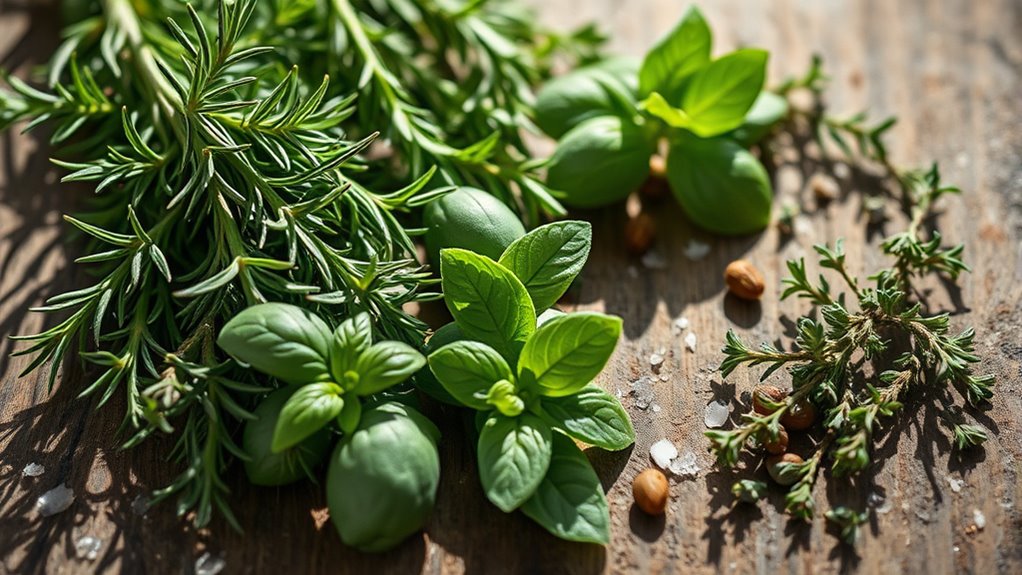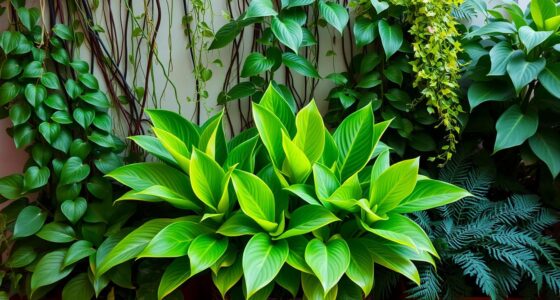Fragrant herbs like basil, rosemary, thyme, and mint serve as your natural allies, elevating both your dishes and well-being. They add vibrant flavors and aromatic depth, transforming simple meals into memorable creations. Many herbs also offer health benefits, such as supporting digestion, fighting infections, or reducing inflammation. By incorporating these versatile plants into your daily routines, you can enjoy both delicious and natural remedies. If you keep exploring, you’ll discover even more ways these aromatic allies can benefit you.
Key Takeaways
- Fragrant herbs like basil, rosemary, and thyme enhance culinary dishes with aromatic qualities and complex flavors.
- Herbs such as peppermint and ginger support health through digestive soothing and anti-inflammatory effects.
- Historically, herbs like chamomile and lavender have been used as natural remedies for relaxation and skin healing.
- Incorporating herbs into daily routines can boost immunity and wellness naturally through teas, oils, and seasonings.
- Pairing fragrant herbs with complementary herbs or ingredients creates synergistic effects for flavor and health benefits.

Fragrant herbs have long been valued for their aromatic qualities and culinary versatility. When you incorporate herbs like basil, rosemary, or thyme into your cooking, you’re not just adding flavor—you’re enhancing the overall sensory experience. These herbs bring a burst of aroma that can elevate simple dishes into memorable meals. Their culinary uses are widespread, from seasoning roasted vegetables to infusing oils and vinegars, making every bite more vibrant and complex. But their benefits go beyond taste; many of these herbs have medicinal properties that can support your health. For example, peppermint is known for soothing digestion, while oregano boasts antibacterial qualities. By using herbs intentionally, you’re tapping into a natural way to boost wellness alongside deliciousness.
When you explore the medicinal properties of fragrant herbs, you find a rich history of natural remedies. Many herbs contain compounds that help reduce inflammation, fight infections, or ease common ailments. For instance, chamomile isn’t just a calming tea; it also has anti-inflammatory effects that can soothe skin irritations or minor wounds. Lavender, famous for its scent, also possesses antimicrobial properties and can promote relaxation when used in aromatherapy. Incorporating these herbs into your daily routines doesn’t require complex preparations—simple teas, infusions, or topical applications often suffice. By understanding their medicinal properties, you can make more informed choices about which herbs to keep on hand for health support, aligning traditional wisdom with modern needs.
In your kitchen, fragrant herbs can serve as natural remedies, but they also have a role in holistic wellness. For example, fresh ginger, often used in cooking, has powerful anti-nausea and anti-inflammatory effects. Adding a few slices to your tea or stir-fry can be both a flavor boost and a health enhancer. Similarly, herbs like sage do double duty; they season poultry and also possess antioxidant properties that can support your immune system. When you start viewing herbs as more than just flavoring agents, you open yourself up to a world of natural healing options. Their medicinal properties aren’t just anecdotal—they’re backed by scientific studies, making them a safe, accessible way to improve your well-being.
Frequently Asked Questions
How Do Different Herbs Influence Mental Well-Being?
Different herbs can positively influence your mental well-being through herbal aromatherapy, offering various mental health benefits. For example, lavender calms your nerves, reducing stress, while peppermint boosts alertness and focus. By incorporating these herbs into your routine, you can enhance your mood, decrease anxiety, and improve overall mental clarity. Exploring herbal aromatherapy allows you to harness nature’s power, supporting your mental health naturally and effectively.
Can Fragrant Herbs Repel Pests Naturally?
Like a shield of fragrant mist, herbs can naturally repel pests. You can plant pest-repelling plants such as basil, mint, or lavender around your garden to keep insects at bay. These herbs act as natural deterrent strategies, creating an aroma that pests dislike. By integrating these fragrant herbs into your garden, you harness nature’s own pest control, reducing the need for chemical solutions and promoting a healthier environment.
What Are the Best Storage Methods for Preserving Aroma?
To preserve aroma effectively, you should focus on herb drying and storing in airtight containers. After harvesting, hang herbs upside down in a cool, dark place to dry thoroughly. Once dried, transfer them to airtight containers to lock in fragrance and flavor. Keep these containers away from direct sunlight and heat, ensuring your herbs stay aromatic and fresh for longer periods. This method maintains their natural scent and potency.
Are There Any Herbs Safe for Pets?
While it’s wise to be cautious, some pet-friendly herbs and safe aromatic plants can bring joy without harm. You can consider herbs like basil, parsley, and chamomile, which are generally safe for pets. Always verify specific plants before introducing them to your home, as even safe herbs might cause mild discomfort to some animals. When in doubt, consult a vet to ensure your aromatic choices keep your furry friends safe and happy.
How Do Climate Changes Affect Herb Cultivation?
Climate changes impact herb cultivation by altering temperature and rainfall patterns. You need to adopt climate adaptation strategies, such as adjusting planting schedules and selecting resilient herbs. Understanding herb cultivation zones becomes essential, as some herbs may no longer thrive in traditional areas. By staying informed and flexible, you can guarantee successful herb growth despite shifting climate conditions, safeguarding your garden’s productivity and health.
Conclusion
As you embrace these fragrant herbs, you invite a symphony of scents that dance like old friends in your kitchen. Their aromas wrap around you like a warm hug, turning everyday meals into memorable moments. Remember, these herbal allies aren’t just flavors—they’re nature’s poetry, whispering stories of earth and passion. So, trust in their magic and let their fragrant embrace transform your cooking into a fragrant garden of joy.








